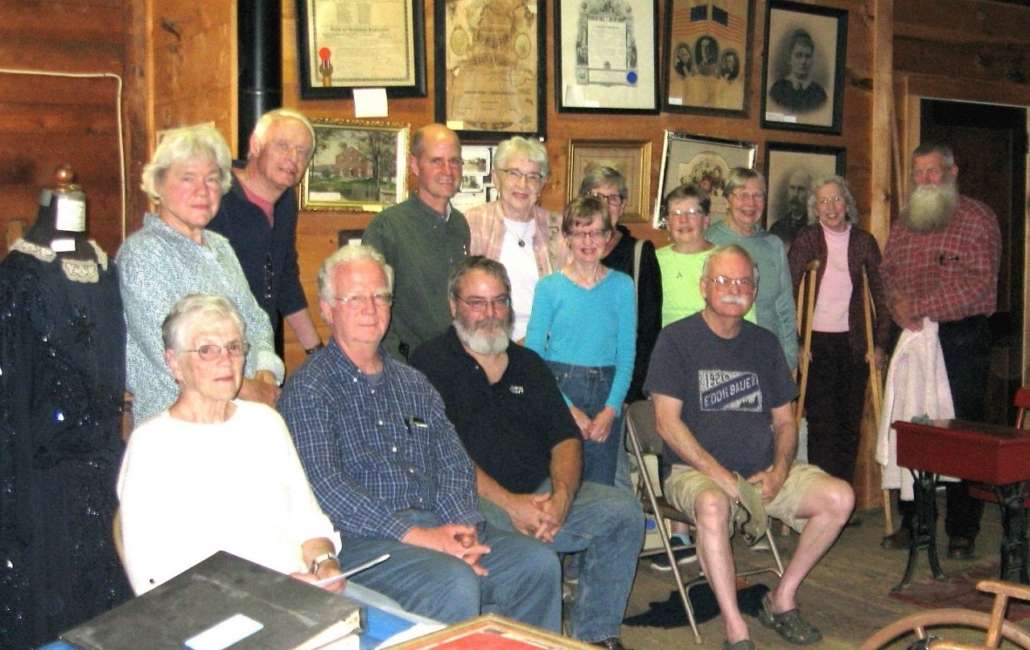CHINA: Only half dozen attend first broadband committee information meeting
 by Mary Grow
by Mary Grow
Only half a dozen residents came in person to the China Broadband Committee’s (CBC) first public informational meeting July 11, with three or four more watching virtually; but discussion was lively and varied during and after the committee’s slideshow.
The purpose of the meeting was twofold: to explain what the committee, created by China selectmen in 2017, is doing and plans to do, and to enlist support for the expanded and improved broadband service committee members hope to offer.
Sharing the explanations, committee members said their goal is to provide affordable, reliable, high-speed internet to every China householder who wants it. They talked about the need for adequate bandwidth so students can do schoolwork while parents manage their office work from home, without computers slowing.
A main advantage of the plan, in committee members’ opinions, is that the town will own the fiber network. The committee has worked for months with Mark Ouellette, President of Machias-based Axiom Technologies, and plans to contract with his company to run the system.
Replying to questions from resident Brent Chesley, Ouellette said his standard contracts run for 10 to 15 years, with “kick-out clauses” at three-year intervals in case China officials become dissatisfied. Axiom will be the internet service provider, will be responsible for all needed repairs and will hire a local service technician to provide speedy customer service.
To make the system work, a new fiberoptic network needs to be built throughout the town. The first steps in building the network are surveying existing infrastructure, notably telephone poles, and obtaining construction money.
CBC members are ready to contract with Hawkeye Connections, based in Poland, Maine, to do the survey. The cost is estimated at $10,000. So far, an application for a state planning grant has failed, and China selectmen have postponed action on using town funds to their July 19 meeting.
Until the survey is done, the construction cost is a rough estimate: $5 to $6 million. Committee members intend to ask selectmen to ask voters to approve a bond issue on Nov. 2 to cover the cost – or maybe only part, if the CBC can get one or more construction grants, committee member Jamie Pitney suggested.
Grants are definitely a possibility, ex officio committee member and Selectman Janet Preston said, because “Broadband is the buzzword right now, with federal and state governments.”
Ouellette agreed. Municipally-owned broadband is “a movement” in Maine, he said, partly because of the pandemic increasing the need for reliable service and partly because many residents are tired of the inadequacies of their commercial providers.
Another point committee members made repeatedly is that their plan will not increase taxes. User fees will cover Axiom’s costs and profit and the bond repayment. After the first two years, fees will generate revenue for the town, which will increase when the bond is fully repaid (presumably after 20 years).
The present plan is for tiered levels of service at different prices. Ouellette and committee members have repeatedly said they hope to price the lowest tier, 50 over 50 (50 megabits download and 50 megabits upload), at around $55 a month and the highest tier, gig over gig (one gigabit down and one gigabit up), at no more than $200 a month.
The construction phase is expected to last up to two years and to include free connections and hook-ups for all immediate subscribers. People who build a new house or decide they want broadband later are likely to be charged to connect; but grants, broadband revenue or some other source might control costs.
The system will have excess capacity to accommodate growth, Ouellette said.
Committee members did not ignore the uncertainties in their projections and plans. One unknown is how many China residents will sign up for Axiom’s service. Revenue projections are based on an initial rate of 35 percent, or 835 households – conservative, committee members said – and a five percent a year increase.
Construction costs are another unknown, not only because of lack of information about current facilities, but also, committee members said, because growing interest in broadband expansion could lead to higher materials prices, supply bottlenecks, contractors’ delays or all three.
Committee member Tod Detre pointed out that if voters approve the bond issue on Nov. 2, selectmen can postpone acting if too few residents have signed up, prices have gone too high or other unforeseen difficulties have arisen.
Committee members and audience member Paul Blair, a Winslow native who now lives in Silicon Valley and vacations on Three Mile Pond, hope all will go smoothly. They listed some of the benefits if China had one of the best broadband systems in the state, including offering gig over gig service:
— Part-time residents like Blair could spend more time – and money – in town, because they could work from their vacation homes, visit their doctors via telemedicine and generally be geographically more independent.
— Full-time residents, especially those currently poorly served or not served at all, would have faster, more reliable internet for work, education, socializing, entertainment and other on-line activities.
— New businesses, especially high-tech businesses, might consider locating in China, making the CBC plan “an investment to develop the community,” Pitney said – but not to turn China into a city, Blair and fellow audience member Jeanne Marquis added.
The July 11 community meeting was recorded and is available for viewing on the town website, www.china.govoffice.com, under the Live Stream heading on the left side. The Live Stream page includes lists of previous and future meetings.
Detre has the assignment of developing a CBC website on which information can be posted between meetings. He invites anyone with website experience who would like to help to get in touch with him at tod@tod.net.
CBC members scheduled their next virtual committee meeting for 5 p.m. Thursday, July 15. One topic on the agenda will be planning future informational events.
Responsible journalism is hard work!
It is also expensive!
If you enjoy reading The Town Line and the good news we bring you each week, would you consider a donation to help us continue the work we’re doing?
The Town Line is a 501(c)(3) nonprofit private foundation, and all donations are tax deductible under the Internal Revenue Service code.
To help, please visit our online donation page or mail a check payable to The Town Line, PO Box 89, South China, ME 04358. Your contribution is appreciated!





Leave a Reply
Want to join the discussion?Feel free to contribute!